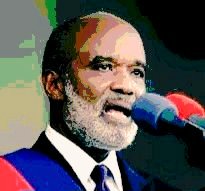By Jean H Charles
I have been reflecting and pondering on why Haiti is not developing harmoniously while it has an optimum population -- 10 million people -- resilient, industrious, willing to work for almost nothing (a base revenue or a salary of $500 per month for each working Haitian would create a brand new middle class and provide an extraordinary boom to the Haitian economy!) I have found respect or the lack thereof is the missing ingredient that could propel the Haitian recovery.
This lack of respect is almost universal. The Haitian government, the international community, the NOGs implanted in the country and by ricochet the Haitian people toward each other are all culprits in this chain of disrespect that infect the seedling of a relationship that would produce a tree filled with welfare, generosity and good hospitality for all.
As the Haitian people and the rest of the world were commemorating last week the January 12 earthquake that devastated the capital and the surrounding cities, it is proper to recall how the Haitian government under the baton of the man who is now proposed to become the next chief of state of the country has collected the bodies and proceeded with their inhumation.
Pay attention to this wrenching story as recalled by my parish priest of St Louis King of France in Port au Prince. Armed with a leadership style that is not obvious in Haiti, the priest went to scout out the place where thousands of victims of the earthquake were placed in order to bring the whole congregation to a pilgrimage to pay respect to the dead ones.
His description brought tears in the eyes of the parishioners. He could not find the place except the frame of a small hill where the goats and the pigs were roaming freely. An eyewitness told him that 60 large trucks were in line to dump the bodies to a former site -- Ti tayen -- where the dictatorial regime of the Duvaliers used to kill its opponents.
There was a small riot by the surrounding populace at the infamous site, forcing the macabre convoy to be diverted further to St Christopher, where they unceremoniously dumped the bodies. Dirt was put on the dead by tractors, making a small hill. The site has been abandoned since, with no memory and memorial, visited only by the goats and the pigs.
In life as in death, the Haitian government treats its people in oblivion. The living do not fare better. The capital city is filled with garbage not collected for weeks or months sometimes. The public market is in condition so filthy that it should shock the conscience of any civilized person.
Cape Haitian the second city of the Republic, a museum style treasure that should be cherished not only by the citizens of Haiti but by the rest of the world as a world heritage site because each house is a museum relic of the colonial era. It reflects the decomposition of the profound disrespect of the Haitian government towards its own people.
Sewers have not been cleaned for decades. For a population of half a million people there is no public water distribution. The lack of leadership in service delivery is only equal to the limitless resilience of the Haitian people in accepting and living with the squalor imposed upon them by their own government.
The rest of the country is completely abandoned with no dedicated funding going directly to any of the cities or the rural villages. The First Lady in a recent interview to the Associated Press was offended at the national and international press for treating her husband president as derelict in leadership style. Using the lowest denominator on the evaluation scale, one cannot find a better characterization. As a scholar educated abroad, I know the First Lady know better!
The international community, in spite of the outpouring of generosity following the earthquake, has treated Haiti and the Haitian people with contempt. The Organization of American States (OAS), the main actor in framing the political transition, has not made any excuses, pardon or retribution to Haiti for contributing to the destruction of its economy through the enforced embargo against the country in October 1992 for reasons that had nothing to do with reason, logic, and good politics.
The president (Jean Bertrand Aristide), who was expelled from the country, was so divisive in tearing apart the very fabric of society that it has not being able to be woven again. Imposing an OAS-led embargo for his return was the high point of insanity, nay, stupidity!
Accurate reports by international organizations have found one thousand children dead of malnutrition every month during the two years embargo. The destruction of the environment was accelerated and maintained since the embargo. The Haitian economy has taken since a deep decline it has never recovered from.
The disrespect of the OAS/CARICOM organizations towards Haiti is so deep that you will not find one single Haitian professional in the policy making decision of either organization, in spite of the fact the population of Haiti and the immigration issues confronting the region and its relations in the context of public private international law necessitates a Haitian voice and insight in the policy deliberations.
The OAS resident in Haiti, Mr Ricardo Seitenfus, a scholar on Haiti in his own right, in a departing shot, has expressed with a phenomenal clarity the true picture of Haiti vis a vis the international community. “The international reconstruction commission to this day is searching for its real functions. (As such) 11 billion collected for Haiti never got to the country. Haiti needs a peace mission not a war mission. MINUSTHA has been an albatross out of place devoid of a true mission thrown into Haiti as a cottage industry for its own needs not to bring relief to the people; in the case of Haiti we need not a security council but a council for social and economic development. If people imagine that Haiti future can be made through MINUSTHA or through the NGOS we are deceiving the public opinion and we are deceiving the Haitian people.”
For these accurate comments Mr Seitenfus was fired by the OAS Secretary General at a critical time when his judgment is necessary to facilitate the smooth transition of the Haitian democratic process.
In the next weeks the lack of respect of the OAS/CARICOM team will be more evident. A scheme concocted last June between the Haitian government represented by one of its ministers, at the headquarters of the OAS in Washington DC, with Mr Colin Granderson and Mr Albert Ramdin to facilitate the Preval regime to maintain its power through a flawed and corrupt election will be either confirmed or tossed out of the basket by the vigilance of the Haitian people and/or the leadership of some friends of Haiti, including the Obama government.
The NGOs have descended en masse into Haiti after the earthquake. The emergency support was unprecedented, yet the haphazard mode of reconstruction is offensive to the nation. A giant ghetto -- Corail -- is being planned and executed with the funds donated by the people of the world while the rest of the country needs decent housing, convenient school and hospitals and incubation for business promotion. Massive amounts of money are channeled to truck water distribution when the purification could be done easily at the source.
Their intrusion into the country would be beneficial if they would agree amongst themselves to coordinate their work and pay a decent salary to their workers – a minimum of $500 per month to the unskilled. The NGOS represent also a safe harbor for the thousands of Americans, Europeans, Canadians and South Asians who cannot find a job at home. One of them told me the truth: “But for Haiti, I would still be unemployed with a 14% rate of unemployment in Florida.”
Finally but not least, the lack of respect of the Haitian people amongst themselves is contagious. The public officials in their tainted cars with all the privileges showered upon them by the government exhibit an arrogance that echoes the master-servant relationship. Haiti, the land where democracy and human rights took birth in the western hemisphere, is today a de facto apartheid state. The vicious circle of disrespect by and amongst the ordinary citizen is pervasive. It can be seen in the public transportation, in the delivery of the health system, in schools and the organization of the public markets.
The rebuilding of the country must start with the most elementary ingredient: respect for each citizen and respect for each other. The spirit of the hundreds of thousands who lost their lives in the January 12, earthquake demand no less! One year after the earthquake, faced with a complete disorganization of the international institutions, as well as the low level of the trickling down of the recovery resource, it has become clearer for each Haitian that salvation can only come from within, starting with respect for and to each other.
Note:
January 12 of each and every year should be dedicated as a Day of International Solidarity with the people and the Republic of Haiti to honor the 300,000 dead from the earthquake, spirit the 1.5 million internal refugees out of the fetid camps into self dependence and last but not least usher into economic self sustenance eight million (out of ten million) Haitian people who live now in abject and extreme poverty!
January 17, 2011
caribbeannewsnow



